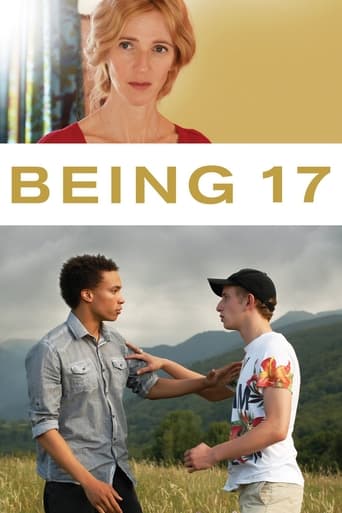proud_luddite
In a small town in the mountainous Pyrenees region of France, two teenage boys in the same grade have an intense dislike for each other: Damien (Kacey Mottet Klein) who lives in a pleasant house in town and whose family is well-off; and Tomas (Corentin Fila) who is bi-racial and adopted by a farm family whose home is a long distance from town. Lurking beneath the mutual contempt is a sexual tension.The beautiful location enhances the charm and depth of this moving film. In addition to the story of the two boys, there are subplots in each of their families that add greatly to the story overall. While the story of the boys' conflict seems to linger too long, the movie can be credited for being unpredictable and full of surprises.The characterization of Tomas is particularly rich and filled with contradictions. In one moment, it is easy to despise him for his bullying ways; in the next moment, it is easy to pity him for his difficult daily life and the uncertainty due to a change that is about to happen in his family. Though not explicitly explored, he also has the difficulty of seeming to be the only non-white person in the small town.The actors are both great in their roles as is Sabine Kiberlain who plays Damien's mother and is also a doctor. She's very nurturing in both roles and is also quite touching as someone in a crisis in the movie's second half.By the film's end, one has compassion for all of its characters.
Mark
A well-developed story line with great and realistic character development. The writers obviously believed in these people, and the actors were given the chance to flesh them out for sure.The people are interesting, (and handsome,) the scenery is great and diverse. The changing seasons really added to the overall feel of living with these people in their real lives. Nothing is forced, the director takes his time to allow you to grow with these people, to really understand who they are.If you want to see a great gay-themed movie that steps outside the box, this will be the one to watch.
tonysloane
I was hoping it would be an interesting, and ultimately a gay film that I could relate to, but as previously alluded to on another critiqe, it was was a complete mish mash of scenes. What occasioned the animosity between the two boys? What was the visit to the gay farmer all about? There was no explanation. In fact there was no explanation for a number of scenes, and the final realisation that the boys were in love was condensed into a ten minute finale. A deeply disappointing movie, that was only worth five stars for the attractive boys that acted in it.
JPfanatic93
This film, which in English speaking territories is released under the title Being 17, at first has all the hallmarks of your typical teenage drama. There's two seventeen year old boys and a fair bit of animosity between them. However, where usually there's girls or social status involved in explaining said strife, that is not the case here. In fact, there's no particular cause for their mutual dislike at all, it's just there. So we can imagine the horror on the one boy's face when his mother invites the other to come live with them. It's a generous but odd decision, considering their rivalry is there for everybody to see. It's not the oddest choice Quand on a 17 ans makes, since the intention of this film is showing the start of a homosexual relationship. You'll have a tough time believing this film, which takes place over a period of about 18 months, will see the relation between the boys change from mutual hatred and the occasional bit of violence to underscore that feeling, to genuine, physical affection between the pair.Director André Téchiné - himself a gay man - is no stranger to both gay drama and teen angst. However, he felt the subject material needed the aid of writer Céline Sciamma to flesh the characters out to their best extent. Sciamma recently came off the teen drama Girlhood, which also showed rough relationships between youngsters (though all of them girls in that particular case), but despite the 37 year difference in age between herself and her director, she proves a right addition to make the teen dialogue that much more snappy and convincing. Aided by strong, not to mention daring, performances from both the young actors and their more experienced counterparts, the script goes a long way to make the unlikely transformation from one state of affairs to the other feel that much more real. Cinematography and editing do their bit as the movie moves from a snowy, cold opening to a warm and colourful close in summer, as a perfect (but rather obvious) metaphor for the change in teen moods.Nevertheless, for the audience it's still a far cry from hate to love (especially a type of love this deeply felt) in just under two hours time. All the ingredients are there to make us convince this is transpiring, but it just moves too fast to make us feel it with the two main characters. It has the pretension, conscious or unconscious, of an emotional epic the likes of La Vie D'Adele (better known as Blue is the Warmest Colour in many regions), but unlike that wonderful film, it just cuts the time necessary to make it equally emotionally compelling for us by a third. We cannot help but feel things are rushed, even though the movie cannot be accused of being fast paced. A change in teen nature of this magnitude simply begs more illustration for full emotional immersion, it seems.



